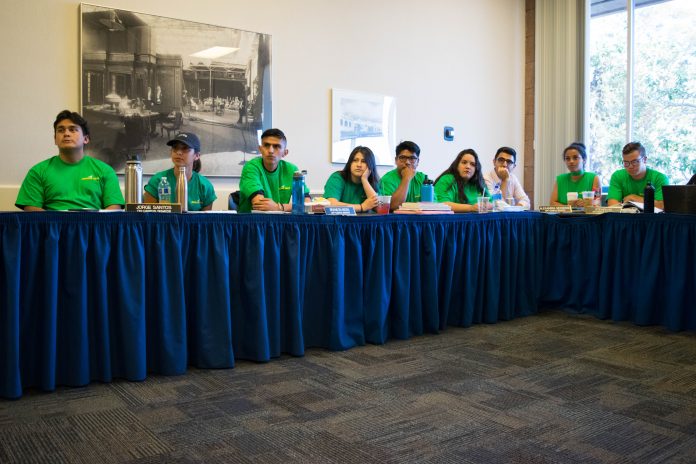
Lauren Marnel Shores
Campus Beat Reporter
On Wednesday, the Associated Students Senate approved the A.S. budget for the 2018-2019 school year. Projecting an enrollment of at least 19,000 UCSB undergraduates, the budget allocates $13.8 million dollars worth of student fees to be distributed among funds for various A.S. entities and student resources as approved by the Associated Students Senate.
According to the Financial Policies and Procedures, a preliminary budget must be given to Senate the third week of spring quarter, and the final budget must be given by the fourth week. However, multiple A.S. senators said that they were not forwarded the president’s budget until hours before this week’s meeting, six weeks into the quarter.
“We were supposed to receive the president’s budget at the meeting before,” said University-Owned Housing Senator Andrea Reyes. “We got it literal hours before the senate meeting. We need time to make sure that all the funding is going in the right place.”
As a result, much of Wednesday’s meeting was spent approving the budget line-by-line to give Senators an opportunity to discuss and vote on individual changes to the budget. Had the Senate not passed a budget this week, the president’s budget would’ve automatically passed as-is.
“The budget needs to either be looked at by Senate tonight, or it’s just going to be the president’s budget,” explained Internal Vice President Jasmine Sandhu. “I sent it out as soon as I got it.”
A.S. President Hieu Le has not responded to The Bottom Line’s request for comment about the timeliness of this year’s budget.
Of the 30 A.S. entities requesting funding for the 2018-2019 school year, only six were not granted the full amount asked for. These groups include Elections Board, Investment Advisory Committee, Global Gaucho Committee, Public and Mental Health Commission, and Senate.
In particular, the budgets for Global Gaucho Commission and Public and Mental Health Commission became topics of debate at Wednesday’s Senate meeting.
Senate voted unanimously voted to fund $19,800 of the requested $60,300 for Global Gaucho Commission’s budget. Though only a third of the original request was granted, the final budget remains much higher than Finance and Business’ budgetary recommendation, which was only $8,300.
Grecia Martinez, College of Letters and Science Senator and co-creator of Global Gaucho Commission, said “it’s inappropriate not to see the importance of reputation and how much money could best be used to go to students,” in reference to Finance and Business Board’s proposed budget.
“We’re presenting this issue to Senate, and this is the situation that did happen, whether people want to validate it or not,” Martinez said.
Ultimately, however, Global Gaucho Commission was only given partial funding because it is a brand new BCU, having yet to hold its first meeting as an organization.
The Public and Mental Health Commission received an even smaller percentage of their requested budget. Asking for $108,900, Senate voted 13-0-9 to allocate $26,000 for the organization, just less than a quarter of the full amount.
Overall, A.S. entities were allocated an additional $700,000 in total between this year and last year’s budget. This is because the 2018-2019 budget expects to collect funds from at least 19,000 undergraduate student fees, whereas last year’s budget only projected 18,500.
Regarding University Designated fees for resources including CLAS, Rec Sports, and Student Health, the money generated from student fees for these extra 500 students alone increases the cumulative budget by $146,000. Looking at just Student Health, which holds the largest university designated fee at $22.70 per quarter, this enrollment growth will produce a $40,000 budgetary increase for next year.
Any additional student fees collected from over-enrollment will be distributed between lock-ins, and the rest of funds that are left undesignated will be included in a fund set aside for student organizations to assist putting on programs and events that benefit the community.










